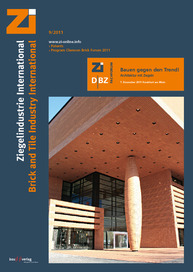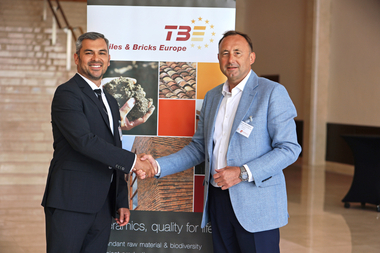Dear Readers,
On 19 May, at the Climate Change Committee, national government representatives approved the draft European Commission (EC) decision that proposed to add the sector “brick, tiles and construction products, in baked clay” to the existing list of sectors exposed at significant risk of “carbon leakage”, i.e. companies under pressure from EU environmental legislation are forced to relocate their factories and jobs outside the EU. The Council and the European Parliament (EP) still need to formally endorse the proposal. According to the revised Emission Trading Scheme (ETS) Directive, sectors which are exposed to significant risk of carbon leakage will receive free allocation corresponding to 100% of the benchmarks, whereas the level of free allocation for the other sectors will start at 80% in 2013 and decrease to 30% in 2020. Together we were able to demonstrate that the sector fulfils the qualitative criteria set in the revised ETS Directive. Our inclusion in the carbon leakage list was a crucial target to ensure a level playing field and clearly shows the value of common action through our associations.
In June, the EC published its European standardization proposal, which includes legislative and non-legislative measures. While the application of standards remains voluntary, more and more CEN standards are developed and used in support of EU policies and legislation. The EC proposal will now be reviewed by the EP and the Council and we will have to voice our opinion on the matter as the EC wants to increase the role of consumers, small businesses (SMEs), environmental and social organizations in the drafting of European standards.
According to the EC, resource efficiency means using the earth‘s limited resources in a sustainable manner. To do so, we should produce more value with fewer resources, lessen our environmental impact and consume more intelligently. Recycling, incentives and price signals are at the core of the EC Roadmap for resource efficiency. In order to assist its drafting of future policy options, the EC recently published its online consultation on the sustainable competitiveness of construction enterprises. TBE has provided answers to the EC and now awaits the Communication and Regulation proposal expected for later this year.
Furthermore two important legislative acts have been adopted by the European legislators in the last two years, the Energy Performance of Buildings Directive (EPBD) and the Construction Products Regulation (CPR). Some major provisions of the two legislations are still outstanding and will be negotiated in the coming month as EC proposals for delegated acts. Therefore we have to follow these dossiers closely and coordinate our positions accordingly.
As you can see, there are plenty of issues where we define our position together and therefore I hope to see you in Cyprus to discuss this with you further.
Yours Dr. Heimo Scheuch
President of TBE






